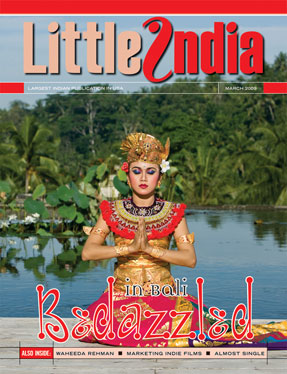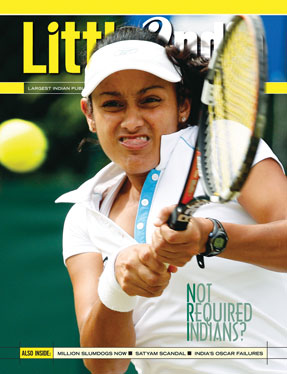Letters
Letters:April 2009

Letters:April 2009
| I don’t get it. What’s the problem here? (“Not Required Indians,” February 2009). Do you see non-Chinese representing China in any event? The lament seems to be that we know all the little tricks to bypass the land owning laws, but can’t figure out how to cheat at sports now. You signed up for a different country, try representing them. You are in fact Not Required. Got one bit right. Rajeen Jain, Via eMail
Little India often raises issues, or argues viewpoints, that are offbeat — at least offbeat among mainstream Indians I know. But I am disappointed in the feature article “Not Required Indians” (February 2009), because it fails to raise or emphasize a very fundamental point of view.
If anyone can represent India in sports it may well improve the country’s chances in world competition. But there is another side to this story. What about the right that comes with being a citizen of a sovereign country? Repeatedly, the article mentions passport or citizenship as if they were mere technicalities! The article references “that pocket-size determinant of Bharatiya citizenship: the Indian passport,” complains of “needlessly inflating the value of national identity and, by extension, of a passport — a document that seems to come in handy only during international travel,” and expresses distress over the “growing generation of foreign-born kids of Indian descent who will be deprived of representing their homeland in international sport because of a paper technicality.” My blood boils when I read this. Citizenship, the constitution of a country (which is written to protect rights of its citizens), the national anthem, flags, these symbols, while they are mere tokens, are sacred. They are not a “paper technicality.” How is India a homeland for a person who does not care about being Indian. If it is a mere technicality then why did they choose the citizenship of another country when the option arose? Why didn’t they say, “I don’t care, it is a mere technicality, you can give me an Indian passport.” When you become a naturalized citizen you have to take an oath. Does the oath mean something? Or is it a mere technicality? When a non-citizen goes to the Olympics and wins the gold medal, which anthem will be played, whose flag should be waving — India’s or the athlete’s adopted country? Should my eyes tear up to see an Indian kid becoming a world champion in something, or should I just say, “This is technicality, for all practical purposes that fellow on the victory stand is an American. He is just there because he could not get selected to represent America.” Until recently, there were no significant benefits to being a proud citizen of India, but many privileges for being a citizen of a developed country. So most people did not think twice about giving up their Indian passport and embracing another country as their own, when they had the opportunity. Now, for the first time, a situation has arisen when being Indian gives you some privileges and these people are angry? There are people like Karm Kumar (mentioned in the article), who have never set foot on Britain soil, yet chose to be a British citizen. Imagine that his father is now filing a petition citing his son’s constitutional rights? Excuse me! Which constitution are we talking about — British or Indian? We NRIs, PIOs and OCIs enjoy the privilege of earning dollars, have a quality of life that comes with living in a developed country, enjoy medical and other government benefits that some developed countries give their citizens, and the convenience of traveling with a U.S. passport. It never hurts our sense of national pride when we give up our Indian passport for these privileges. But now we are offended that India would rather be represented by her rightful citizens and not by us? How dare India do something like that? Why should we have to give up anything to represent the proud nation of India? May be it is because by being allowed to represent India in some athletic category, I displace a poor girl from some village in India struggling to make a living, but doing her best to attain a place in life. She does not have any of the privileges I have by virtue of living in a developed country. The only ground she has over me is that she is a rightful citizen of her country. But let’s take that away from her. Why should I not get the best of everything? I never saw a passport as anything, but a technicality. Why should it mean anything else to the government of India, which is bound to uphold the constitutional rights of her citizens?
The articles “United Socialist Republic of America” and “The New Socialists” (March 2009) remind me of an article by Sita Ram Yachuri, leader of the CPM, who said that capitalism and capitalist institutions are collapsing. There is some hope if the institutions are nationalized, which means turning to socialism. We should not be averse to the names of systems if it saves people and the country. I think U.S. leaders will have to shed their prejudices toward socialism and take measures to correct the economic health of the nation, even if it that works against the interest of the rich few. Apparently Ajay Vishwana–than’s experience (“Retirement: An Iconic Struggle,” February 2009) of seeing his father being rebuked by his grandfather was too traumatic; why else would he paint everyone with the same brush. I agree with him on Lata Mangeshkar and Sachin Tendulkar. They are clear examples where the spirit is willing, but the flesh is weak; the effects of age have taken their toll and body (parts) are no longer supple or nible enough. Sachin specially seems to hang around for 10-12 matches, hits one century or a high score and then his skills vanish for the next 15-20 innings again. Anyone else not supported by the Mumbai lobby would have long been tossed over, but not aapno Sachin. But I totally differ from Vishwanathan’s opinion on Amitabh Bachchan, who, in my opinion, seems to have matured with age. Yes, I would have a problem if he were still doing the main hero’s role or running around trees, but I haven’t seen his skills wane, rather only get better. If it were as elementary as — you old, you no good — then, I guess, Vishwanathan would tell Manmohan Singh and APJ Abdul Kalam that they should sit at home and watch TV. It takes guts to say the unpopular thing (“Retirement: An Iconic Struggle”). The stars the author chose to highlight are very popular and reach most Indians at a sentimental level. I am one of them. I was initially offended by Ajay Vishwanathan’s views, but after deeper introspection, and a few re-reads, I have begun to agree with the writer, who also seems to be a fan of the very icons. Retirement is probably a personal and subjective thing, but some of the stars owe it to their core audience (and not the producers and the money-givers) to bid them a timely goodbye. Thanks Little India for this article, which, I’m sure, generated a lot of heated feedback. After reading so many reviews in the news media about Slumdog Millionaire, I finally decided to watch this movie. Raj Kapoor had shown poverty and slums in his movies, so I was not so much disturbed by the movie showing kids stealing and killing, as much I was disturbed by exploitation of homeless poor kids by the bad guys such as cutting off their limbs or plucking their eyes so that they could beg for more money for them. I could not believe that game show host would play dirty tricks by misleading the contestant by suggesting a wrong answer. But the most annoying part of the movie was constant flashbacks throughout the movie, which confused me a few times. I am still wondering why A. R. Rehman won the Oscars for best music and best song, because the musical scores were nominal and the “Jai Ho” song only accompanied the credits, and had nothing to do with the story. In a nutshell, the movie is nothing but an infomercial for the game show “Who Wants to be a Millionaire,” whose producers are also British. Two years ago, after watching Veer-Zaara, India and its cinema become my passion. My friends and I have created the Indian Passion Association to encourage the distribution of Indian films in France, make the relationship between French and Indian producers easier, and promote cultural dialogue. My apprehension about Slumdog Millionaire was that it would project the stereotypical image of poverty in India. But to think that because of Slumdog Millionaire the whole world would believe that India is only what we see projected in the film is the same as believing that all of Spain is homosexual because Pedro Almodovar, its most famous filmmaker, makes films about homosexuals. David Boyle didn’t destroy my dream. I was profoundly touched by the scene where a woman tells Jamal “You are the millionaire, God bless you.” It was so powerful. The whole city wants Jamal to win. The whole country blesses him. I admit I felt a Hollywood touch. Americans love those kind of mass scenes where everyone is focused on one event. The whole city is in the dream. Will Slumdog Millionaire be the trigger that will strengthen the Hollywood-Bollywood relationship and signal a fusion trend? Studios like Sony Pictures, Walt Disney, NBC Universal, Viacom and Warner Brothers have already invested more than $1.5 billion in TV channels and Bollywood studios. Honestly, I am not really looking forward to this. I hope that despite the recognition that American cinema needs to experiment with new ideas, Bollywood, the dream emerging from a culture so far closed to the West, will be able to preserve its magnificence, its naivety, its fantasy, that it — all things that make it so special. I am going through divorce in US and also have an infant son. When I read Seema Khaneja article (“The India Thing to Do,” January 2009) it resonated so closely with my story, that I felt as if someone just tore and poured my heart out. I wish I had friends like Khaneja who I could talk to and get some insights on how to deal with myself. Thanks for opening your heart. |



You must be logged in to post a comment Login